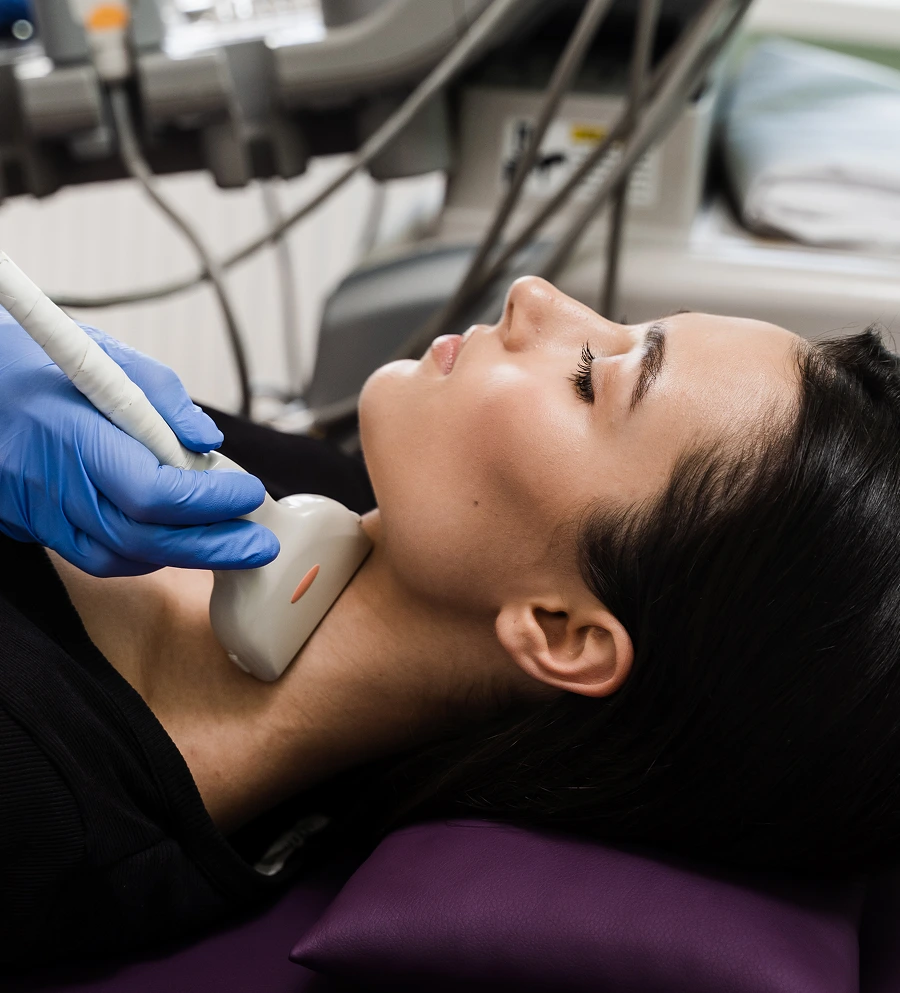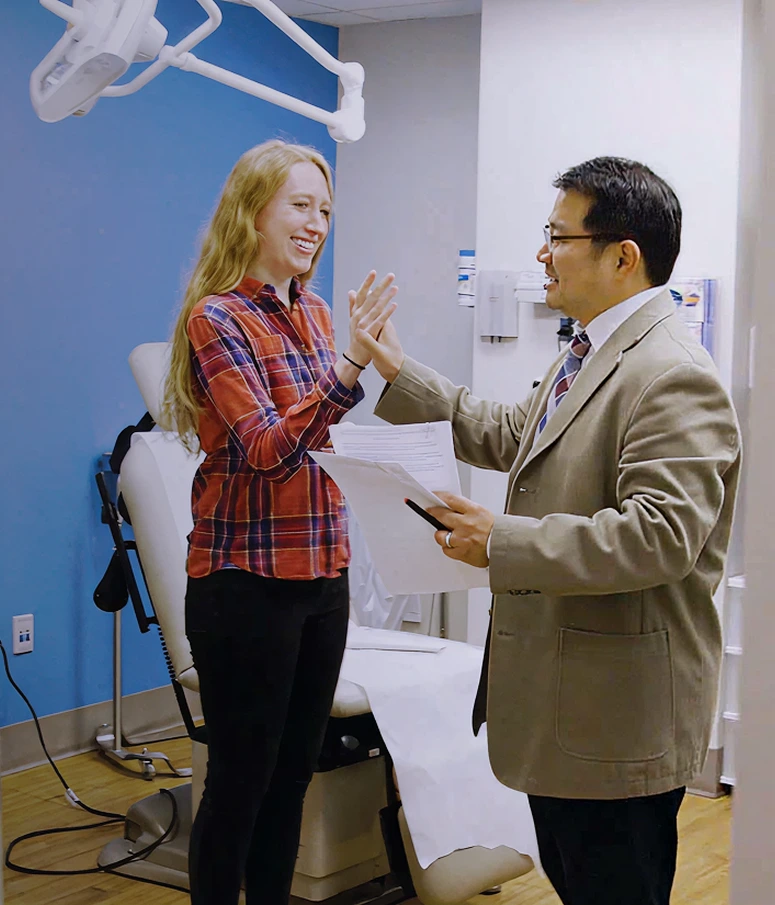Thyroid Radiofrequency
Ablation
in Atlanta, GA
A Minimally Invasive Alternative to Thyroid Surgery
At American Endocrine, we specialize in radiofrequency ablation (RFA) for thyroid conditions. RFA is particularly useful for patients with benign thyroid nodules that cause pressure symptoms related to their size or are visible and aesthetically undesirable. We offer a non-invasive alternative to surgery with excellent outcomes.
What Is Thyroid Radiofrequency Ablation (RFA)?
Thyroid RFA is a minimally invasive procedure that uses radio waves to generate heat and destroy abnormal thyroid tissue, such as nodules. This technique is particularly beneficial for patients with benign thyroid nodules that are symptomatic or cause cosmetic concerns, offering a less invasive alternative to traditional surgery. RFA is used to shrink these nodules, which can alleviate symptoms such as difficulty swallowing or the visible appearance of nodules on the neck.

RFA vs. Surgery:
Which One to Choose
When comparing RFA to traditional surgery, several distinct advantages emerge, highlighting the benefits of RFA as a treatment option. Firstly, RFA is considered minimally invasive, as it only involves a needle probe, resulting in less disruption to surrounding tissues and typically leading to significantly quicker recovery times for patients. This aspect is particularly appealing to those who wish to minimize downtime and return to their daily activities as soon as possible.
Additionally, RFA provides a high degree of precision in targeting the affected thyroid tissue, which helps preserve overall thyroid function by minimizing damage to the rest of the gland. This targeted approach reduces the likelihood of complications, such as infections, bleeding, or potential nerve damage, which are more common in traditional surgery. These factors make RFA an attractive option for patients looking for safer and less invasive treatment alternatives.
Thyroid RFA Procedure: What to Expect
Anesthesia
Once you are determined to be a candidate, the RFA is performed as an outpatient procedure under local anesthesia. You will be awake, lying down comfortably, and communicating with the team throughout the procedure.
Probe Insertion & Treatment
Under the guidance of ultrasound, which provides real-time imaging, a thin needle probe is carefully inserted into the target thyroid nodule. Once properly positioned, radiofrequency wave energy is transmitted through the probe. The entire process typically takes less than an hour.
Observation
Follow-Up Visit

Indications for RFA Treatment
Radiofrequency ablation (RFA) is particularly effective for treating benign thyroid nodules under specific conditions, making it a preferred choice for addressing certain patient needs. RFA is ideally suited for solid or predominantly solid benign thyroid nodules, where it can effectively reduce their size and impact.
This treatment is especially beneficial for nodules that cause size-related symptomatic issues, such as difficulties with swallowing or visible cosmetic concerns, or for nodules that produce an excessive amount of thyroid hormone, referred to as ‘hot’ or ‘toxic’ nodules, which can lead to hyperthyroidism. A simple and quick treatment can improve your quality of life.
Additionally, for RFA to be considered a safe option, the targeted nodules must be located at a safe distance from critical structures in the neck. This precaution helps to avoid potential complications during the procedure, ensuring the safety and effectiveness of the treatment.
Am I a Candidate for RFA?
To determine if you qualify for RFA, a thorough evaluation is necessary, including neck imaging and a fine-needle aspiration biopsy to confirm the benign nature of the nodule. If you are experiencing symptoms related to thyroid nodules and are interested in a minimally invasive treatment option, please reach out to American Endocrine for a personalized consultation. Our team will work with you to assess your condition and discuss whether RFA is the right choice for your healthcare needs.

Thyroid Cancer and
RFA
The role of RFA for small, low-risk thyroid cancer is being studied. The size and location of the thyroid cancer are essential factors. Patients with suspicion of possible thyroid cancer spread to adjacent lymph nodes are not candidates for RFA.
Benefits of Thyroid Radiofrequency Ablation
Minimally Invasive
RFA involves a needle probe under local anesthesia, resulting in less pain and faster recovery. This approach provides patients with an effective method for removing thyroid nodules without the need for open surgery.
Function Preservation
Low Risk
Reduced Solid Nodules
Symptomatic Relief
More Inclusive

Disadvantages and Risks of RFA
While RFA is a safe and effective treatment option for many patients with thyroid nodules, it is not without its limitations and potential complications:
- Incomplete ablation of the nodule: The goal of RFA is to “shrink” the nodule, not to eliminate it. You will need serial follow-ups with ultrasound, and the ablated nodule can regrow, requiring additional treatments.
- No final tissue diagnosis: Compared to surgical resection, there is no tissue specimen for a pathologist to review. A cancer diagnosis could be missed or delayed.
- Although rare, injury from needle probe manipulation and excessive thermal injury to surrounding tissue can occur, leading to nerve damage, bleeding, infection, or other complications related to the procedure.
These risks underscore the importance of careful patient selection and meticulous procedural execution by experienced medical professionals, such as Dr. Suh.
Cost of Thyroid Radiofrequency Ablation in Atlanta, GA
The cost of thyroid radiofrequency ablation in Atlanta typically ranges from $3,500 to $8,000, depending on factors such as the size and number of nodules being treated. Insurance coverage is becoming more common, but for those paying out of pocket, our office can provide a precise estimate during your consultation.
We Offer the Latest Innovations in Thyroid Treatment

